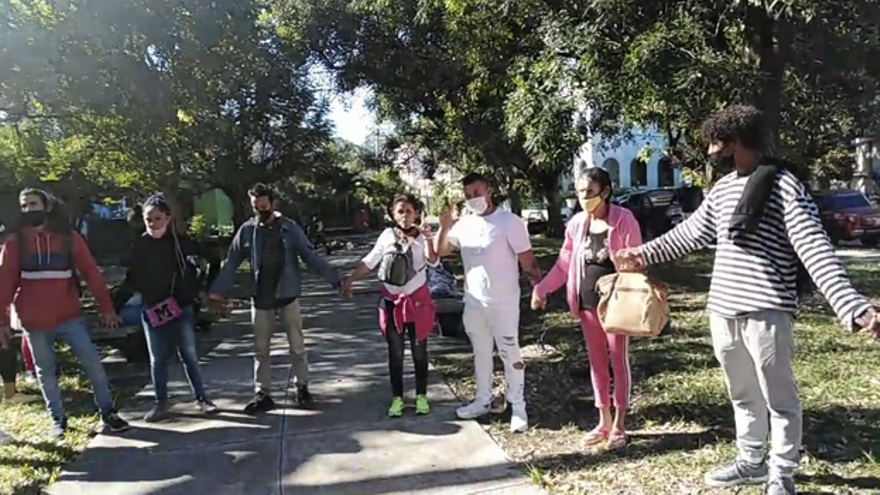
![]() 14ymedio, Frank Calzón, Miami, 8 May 2022 — In the film Nadie Escuchaba [Nobody Heard] about the Cuban political prisoners by the great filmmaker Néstor Almendros, there is a segment of just two minutes with an old woman, which this Mother’s Day makes our hearts tremble. Clara Abraham, Boitel’s widow, recounts with infinite sadness the last days of her son Pedro Luis in a cell in the maximum security pavilion of the Castillo del Príncipe in Havana. The story is also collected by Guillermo Cabrera Infante in his masterful work Vista del Amanecer en el Trópico [A View of Dawn in the Tropics].
14ymedio, Frank Calzón, Miami, 8 May 2022 — In the film Nadie Escuchaba [Nobody Heard] about the Cuban political prisoners by the great filmmaker Néstor Almendros, there is a segment of just two minutes with an old woman, which this Mother’s Day makes our hearts tremble. Clara Abraham, Boitel’s widow, recounts with infinite sadness the last days of her son Pedro Luis in a cell in the maximum security pavilion of the Castillo del Príncipe in Havana. The story is also collected by Guillermo Cabrera Infante in his masterful work Vista del Amanecer en el Trópico [A View of Dawn in the Tropics].
Pedro Luis Boitel, was “a student leader who had fought against the previous regime” but in disagreement with the course of the revolution he began to conspire and “was sentenced to 10 years in prison in 1960, but in 1972 he was imprisoned” and died without medical assistance.
“I spent twelve years fighting to save my son, so that he would die like a dog… I didn’t know where he was… where he was buried. They beat me up. I was imprisoned for eight hours, when they told me: ’Your son he’s dead, we’ve already buried him’…45 days without medical attention. Do you know what it’s like not to give a mother her corpse? Yesterday we 12 women went to take some crowns and a mob of more than 300 people came out from behind the tombs … they came here in need, I had to throw them out of this house.”
In Almendros’ film, she is asked a question about forgiveness, to which the old woman replies: “I have to forgive. It’s very difficult for me, but I have to forgive.”
Unfortunately, in the history of the Cuban nation there have been other mothers and other prisoners. Leonor Pérez, the mother of José Martí, also knew the impotence of seeing the unjust conviction of her teenage son, and tried to obtain a pardon. To try to alleviate the pain of the sore that would never completely heal, as a result of the shackle they put on his leg, Doña Leonor made him a pillow that Martí remembered all his life. Those were other times, but then the relatives of the prisoners also arranged pardons and were allowed to bring them some supplies.
In the 20th century, Lina Ruz de Castro got the archbishop of Santiago de Cuba to intercede with the authorities of the Batista regime to guarantee the life of her son Fidel, who was hiding in a farm near the city after the attack on the Moncada barracks. After the trial, where Fidel made the statement that he would later rewrite in prison with the title History will absolve me, his mother dedicated herself to mobilizing the living forces of the country: the bishops, the press, civic, professional, artistic, and cultural organizations, and the senators and representatives of parliament to obtain an amnesty for all political prisoners, including her son who served two years of a 15-year sentence. Several governments, including the United States, welcomed the move.
Is it possible that a similar management can be carried out in today’s Cuba? Will there be bishops, embassies, international personalities, writers, artists, executives of foreign companies with representation on the island, mothers of government officials, members of the National Assembly of People’s Power who ask General Raúl Castro and President Miguel Díaz-Canel to decree a general amnesty so that the men and women in political prison are released and reunited with their families?
____________
COLLABORATE WITH OUR WORK: The 14ymedio team is committed to practicing serious journalism that reflects Cuba’s reality in all its depth. Thank you for joining us on this long journey. We invite you to continue supporting us by becoming a member of 14ymedio now. Together we can continue transforming journalism in Cuba.
